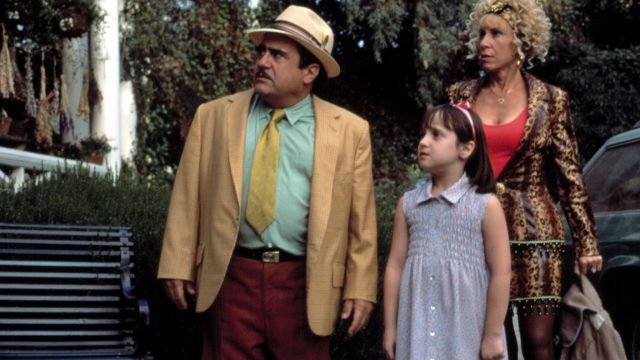In 1996, two Roald Dahl adaptations, Henry Selick’s James and the Giant Peach and Danny DeVito’s Matilda, premiered within months of each other. Both received respectable reviews but bombed at the box office. Despite this, both are fondly remembered today, James and the Giant Peach for its beautifully tactile animation and vivid characters and Matilda for its bracingly dark sense of humor. But while James and the Giant Peach can occasionally feel compromised (Selick’s original concepts for the film were watered down due to costs and commercial demands), Matilda remains a thrilling blend of two simpatico storytellers.
Dahl, a beloved children’s author and famously terrible person (isn’t it strange how those two often go together?), was so embarrassed by what he saw as an overly saccharine adaptation of Charlie and the Chocolate Factory (retitled Willy Wonka and the Chocolate Factory) in 1971 that he didn’t allow another live-action adaptation of another one of his novels until 1990’s Nicolas Roeg-directed, Jim Henson-produced The Witches. Even that movie upset Dahl, who felt that the changed ending was such a cop-out that he removed his name from the film. However, Dahl died later that year, leaving his wife to handle his estate. Matilda was one of the first adaptations to be produced after his death.
DeVito, coming off of 1992’s divisive Oscar play Hoffa, seems like a strange choice to direct a children’s film. However, with few exceptions, his voice melds beautifully with Dahl’s. Adults in Dahl’s world are dumb, brutish, and unrefined as a rule, and DeVito shoots the vast majority of them from low angles or in wide-angle close-ups, making them look monstrous and exaggerated. It fits the tone of the film well, which can get dark while rarely feeling dangerous. The opening scene offers a good case study for the film as a whole: the Wormwoods (played by DeVito and his real-life wife Rhea Perlman) bring their newborn daughter Matilda home in the trunk of their station wagon. While this should register as a horrifying act of child neglect, the baby’s general indifference to the situation negates any real danger.
The opening stretch of the film, with Matilda (Mara Wilson, so good at playing a preternaturally intelligent and kind Lisa Simpson type) waging a one-sided prank war against her inattentive parents and mean-spirited brother (Brian Levinson), is the best part of the movie. DeVito is excellent as Harry Wormwood, one of the sleaziest used car salesmen to ever grace the screen. And Perlman is even better as Zinnia, the wife gullible enough to believe the two IRS agents (Paul Reubens and Tracey Walter) who show up to her door claiming to be speedboat salesmen while looking like nothing but two IRS agents. DeVito, Perlman, and Wilson get to execute some wonderfully constructed physical comedy bits in this opening 30 minutes while keeping the darkness of the story intact.
When the Wormwoods send Matilda to a school run by the dictatorial Miss Trunchbull (Pam Ferris), the film loses some of its comedic juice. It’s never less than engrossing, but the dark comedy of DeVito’s direction and the demands of ’90s children’s movies don’t mesh together as well as they did in the opening stretch. And while Matilda’s telekinetic powers are an interesting idea, they never pay off comedically as well as they should. But DeVito does execute his two best setpieces during this sequence. For many children who saw this movie when it came out, the sequence where Miss Trunchbull forces one of her students, Bruce Bogtrotter (Jimmy Karz), to eat a massive chocolate cake remains a highlight, especially when Matilda leads the school in cheering Bruce on. And when Matilda and the angelic Miss Honey (Embeth Davidtz) break into Miss Trunchbull’s house to prove that she killed her brother (who is also Miss Honey’s father), DeVito really lets fly with an expertly executed suspense sequence. And while the rest of the movie never hits the comedic highs of the first act, there are a handful of funny scenes, such as when Reubens tries to get Matilda to roll over on her family by promising her that they’ll put her in a good orphanage, “the kind with food and teeny tiny cockroaches.”
Matilda has become a touchstone for the children who grew up with it in a way that can’t be entirely written off as unexamined nostalgia. There are dated touches here (mostly with the use of Rusted Root’s “Send Me on My Way”), but perhaps more than any other Dahl adaptation before or since, Matilda recognizes how intimidating the world can be for children. There have been many more adaptations of Dahl’s novels since this one, from Tim Burton’s Charlie and the Chocolate Factory to Robert Zemeckis’s execrable The Witches last year. While Dahl might have been impressed with the faithfulness with which his work was translated in these recent adaptations, few have captured the particular magic of his work as well as this one.

